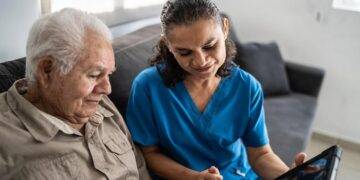Even mild cases of mental illness can highly impact the life of someone living with a condition, so getting quality care from a trained professional is essential. Clinical mental health counselors assess the people who come to them for help and offer a range of treatment programs. They can provide support when it comes to general life challenges, family issues, eating disorders, and emotional problems. The idea is that they will help patients work through their problems using various forms of therapy and support them in developing behavioral changes, in part through providing healthy coping strategies.
The aim is to guide people, to give them ways of coping with negative emotions, and to manage their symptoms. In the end, a clinical mental health counselor hopes to improve their client’s quality of life. As such, this is a very fulfilling role that many people come into as a second career. As they tend to be older, they can use their life experience to inform their practice and show empathy to people in a range of situations. However, finding a way to qualify can be difficult for some.
Now, people who want to retrain as counselors and have a bachelor’s degree in an unrelated field can do so on specially designed courses, like those at the American International College. In the past, it has proved a challenge for working professionals to fit an advanced qualification into their lifestyle, but remote learning has changed all that.
Through an Online Masters in Clinical Mental Health Counseling degree from the American International College, students are taught how to provide services that help groups, families, individuals, and couples work through their issues. Through online coursework and nearby placements, they are trained to make a genuine difference in the lives of their clients and gain the competencies they need to complete their licensure.
What are the supervision requirements for a clinical mental health counselor?
Everyone who wants to become a counselor has to undergo a period of clinical supervision. These placements help support trainees in becoming better at what they do through guidance from a more qualified professional and real-world experience. The exact requirements vary between states and courses, but in each case, there will be a minimum period of supervised therapy, which can be up to 3,000 hours. During these sessions, the student will consult more qualified colleagues about their work, discuss complex cases, and compare treatment strategies. The aim is not just to receive insight but also to encourage the trainee to practice self-care, refine their diagnostic competencies, and, as a result, provide a better standard of care to their patients.
What are the licensure processes in clinical mental health counseling?
Students in a counseling program can apply to their state for licensure before they even graduate. It is often done in the last semester of their course. They will need to start by filling out a form, which can usually be found on their state’s education department website. It will trigger a limited permit, which allows graduates to begin their supervised hours. Once the state has checked a student’s paperwork, they can take the National Clinical Mental Health Counseling Exam (NCMHCE) or whichever licensing exam their state has chosen. Once they have passed this, students can start looking for a job, complete their supervised hours, and eventually apply for a permit to practice independently. The entire process can take months, but this is a key period in the career of any mental health counselor, as they are moving from being a trainee to becoming a responsible, autonomous professional.
What professional development opportunities could clinical mental health counselors consider?
There is a wide range of careers open to mental health professionals in the United States. According to the National Institute of Mental Health, more than 20% of all adults are living with some form of mental illness. In 2021, it was estimated that it amounted to 57.8 million people. As a result, jobs in this role are becoming available at a faster rate than average, as per the Bureau of Labor Statistics. So whichever path students choose, they are likely to find employment quite quickly after they graduate.
Help people work through their disabilities as a rehabilitation counselor
Combining treatment for disabilities with mental health support, a rehabilitation counselor helps patients get through the process of recovering and improving their health. They work in nonprofits, private clinics, and hospitals, helping disabled people with various forms of mental health conditions, as well as injuries or congenital disabilities. The goal is to prepare clients to reenter society in a productive, independent way.
Improve the lives of seniors as a geriatric counselor
Geriatric counselors are employed by clinics, retirement homes, and short-term care facilities to work with older patients with issues such as end-of-life care and transitioning into retirement. Sometimes elders need help when it comes to dealing with the loss of a life partner or friend or the loss of their independence. At other times, it’s simply a case of the counselor helping a client come to terms with their failing health.
Support ex-servicemen and women as a military personnel counselor
When employed to assist military personnel, mental health counselors might work with civilians and members who have worn a uniform. They can help people manage the challenges of having been at war, going back for another deployment, and the feelings they face about returning home for a longer period. The idea is to get soldiers through issues such as post-traumatic stress disorder and deployment anxiety without these problems causing long-term damage to their mental health. When done well, clinical mental health counselors can significantly enhance mental health outcomes for the military.
Resolve domestic problems as a family therapist
Family and relationship therapists help groups of people and couples identify problems in their relationships and get them resolved. They work in private practices, hospitals, and nonprofits to manage disagreements that might arise as a result of unemployment, substance abuse, death, or divorce.









